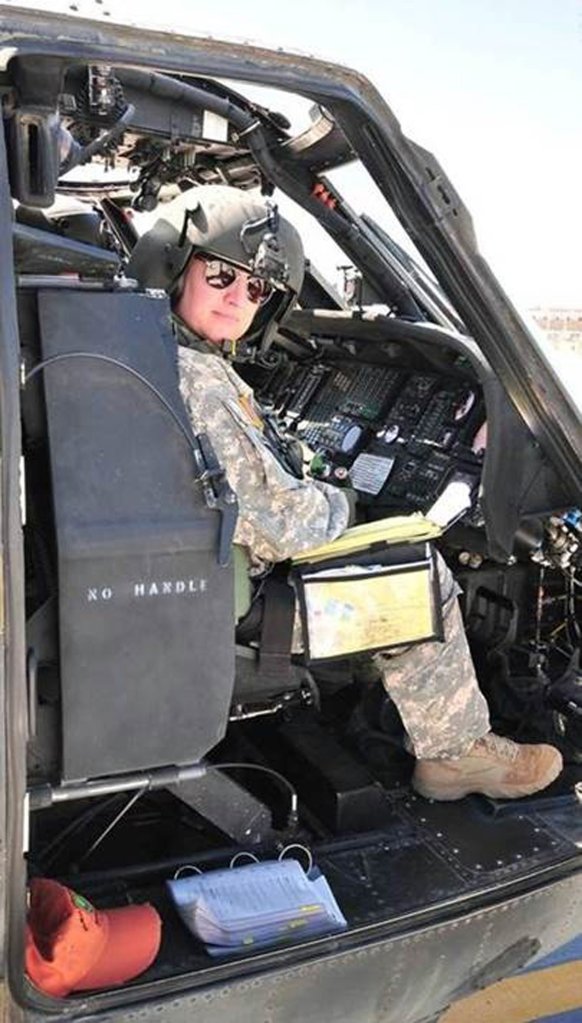Congressman, veteran weigh in on deepening crisis in Iraq
Published 2:00 am Friday, June 27, 2014

- Retired Chief Warrant Officer 4 Stormy McLemore Ripley smiles behind the controls of a UH-60 Black Hawk helicopter. Ripley spent 15 months in Iraq as part of a search and recovery team that located and recovered American and allied forces who were prisoners of war or missing in action.
Top Iraqi officials are preparing to meet next week in hopes of forming a new government to quell a strengthening Sunni insurgency.
News of a new government came on the same day a bombing killed 12 people in a Baghdad Shiite neighborhood. South of the capital, Iraqi police found eight bullet-riddled bodies.
And as Iraq’s other immediate neighbors — Jordan, Kuwait, Saudi Arabia and Turkey — bolster their defenses, the new fighting threatens to unravel a byzantine balance of Mideast alliances and enmities that the United States long has sought to manage. The U.S. is deploying 300 special forces to train and advise the Iraqi army and is conducting surveillance flights. Iran is also flying surveillance drones over Iraq in aid of Iraqi Prime Minister Nouri al-Maliki’s government.
U.S. officials are concerned the destabilization of Iraq could have a domino effect over the Mideast. Citizens fear continued threats against U.S. interests could lead to a prolonged engagement for troops after a highly publicized decision by the Obama administration to draw down forces, citing stability in the region.
Republican Congressman Mo Brooks this week chided the Obama administration for refusing to take the advice of military advisers and members of Congress. He said, however, he couldn’t provide a solid answer on how to move forward in keeping the peace in Iraq.
“Asking me about Iraq is like asking Gen. Robert E. Lee what he should do after his army was decimated at Pickett’s Charge,” Brooks said, referencing the famous Civil War battle that saw at least 50 percent of Confederate forces decimated at Gettysburg. “The time to ask would have been three years ago before the president pulled out our troops that helped preserve the peace in Iraq and helped to keep Iraq functioning. Robert E. Lee’s response was to retreat because his army suffered such great casualties.”
Brooks said the U.S. should have left a peacekeeping force in place, as we had done previously in Japan and Europe following World War II, South Korea after the Korean War and as we had done more recently in Bosnia and Serbia.
“That was the glue that kept the rest of the country together,” he said.
When asked if he feared a similar destabilization in Afghanistan, Brooks was no less pointed.
“If the president treats Afghanistan like he treated Iraq, then we should all expect the same kind of outcome that has occurred in Iraq,” he said. “There’s frustration (from Congress) with the White House and the expectation that it will happen.”
Firsthand knowledge
Retired Chief Warrant Officer 4 Stormy McLemore Ripley said much of the increased violence in Iraq and allied forces’ inability to quell it stems from a lack of a Status of Forces Agreement, or SOFA.
The agreement protects American forces from facing criminal charges in the case of a civilian casualty during military operations. Ripley also provided another example of why the agreement is important.
“Let’s say someone’s shooting at me, and I shoot back at them and tear up a building. If there’s no SOFA agreement, they can arrest me and charge me with damaging that building; I can be held legally accountable,” she said. “The SOFA protects American military folks who are working on behalf of the government.”
Ripley, whose parents are from the Athens area originally, previously served on the board for Limestone County’s Volunteer Organizations Active in Disasters (VOAD). She was also part of a search and recovery team for 15 months in Iraq, from January 2008 to April 2009. Today, Ripley works in airfield operations as a civilian contractor at Fort Bragg, North Carolina.
“I’ve been paying attention (to the events in Iraq) because I’ve lost so many friends there,” she said.
Ripley’s husband, Jim Ripley, is a retired member of the U.S. Army Special Forces-Green Berets. He served in Afghanistan, riding horseback through the mountains as part of his missions.
When asked if she would be willing to go back to Iraq today, she said she would, given certain conditions were in place, including be equipped with the proper resources and if danger, or combat, pay was part of the compensation.
“I’d also want to know that if people are shooting at the people I’m standing next to, and if I get kidnapped, there will be something in place to rescue me,” she said.
Ripley said the success or failure in Iraq would largely depend on restoring the SOFA, and securing Iraq’s borders to prevent insurgents from gaining access to the country.
“It’s like playing tug of war and your big guy goes away for a while and you get pulled over the line,” she said. “If we do the right thing, (Iraq) is not completely lost. We’ve got to make up a lot of ground.”
— The Associated Press contributed to this report.





